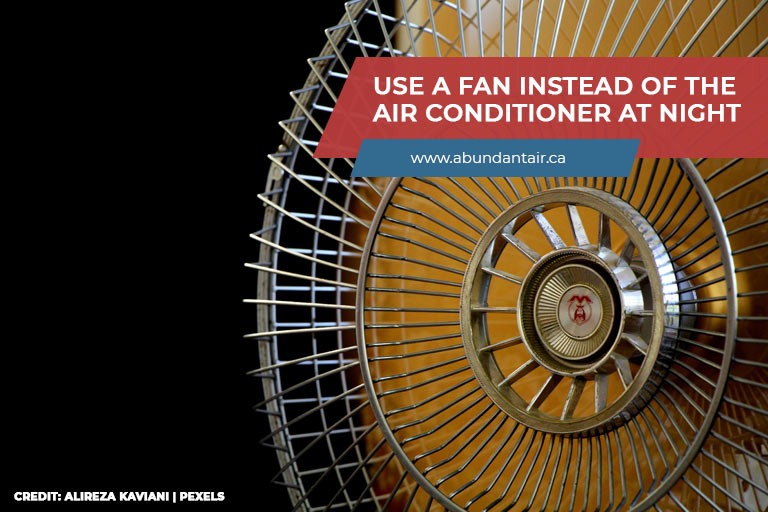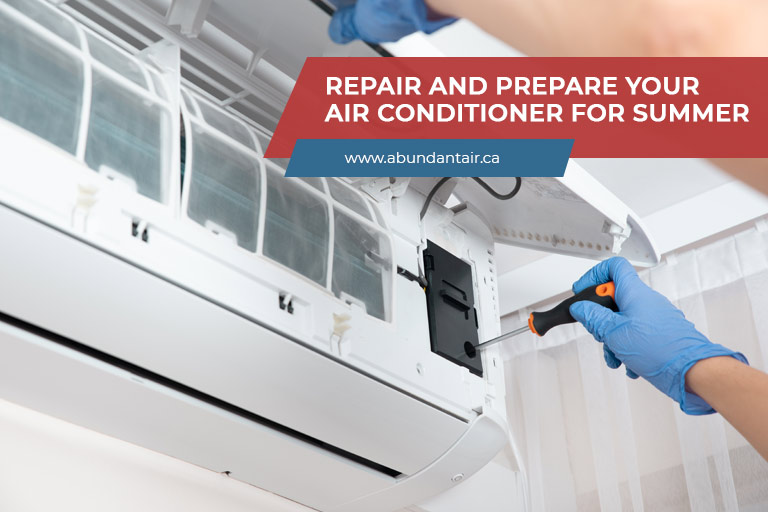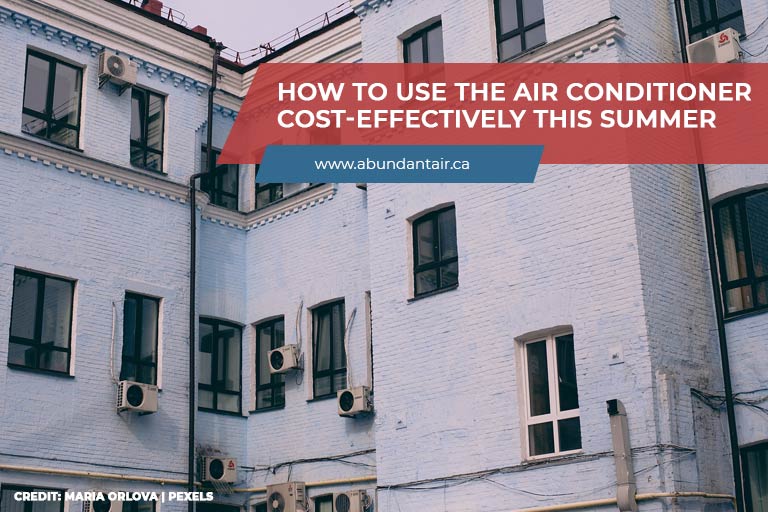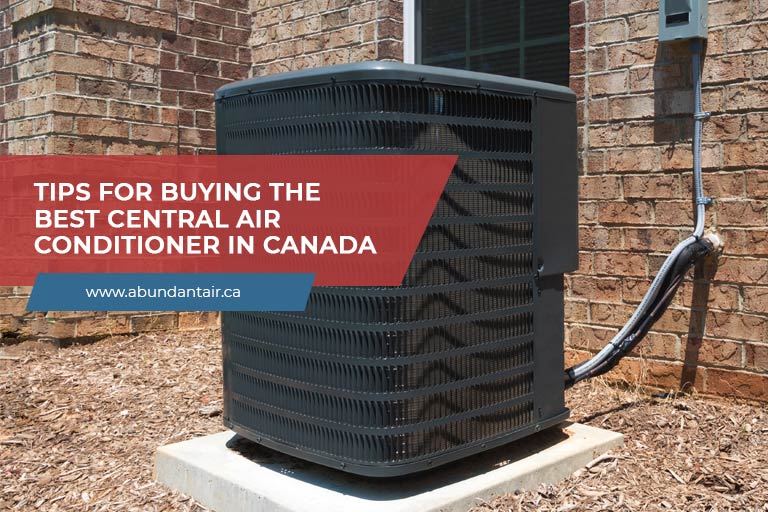When summer arrives, temperatures start to soar throughout Canada. The temperature can hit the mid-30s Celsius, with humidity reaching the upper 40s. Turning on the air conditioner is no longer a luxury, but a necessity during these months. After a long warm day, coming home to an air-conditioned room may be a welcome break. Cooling summer air with air conditioning, unfortunately, comes at a cost — and it’s a significant one. According to research, homeowners using air conditioners spend 35% to 42% more on electricity.
Fortunately, there are a few things you can do to maximize air conditioner efficiency and keep your power cost low while still keeping a pleasant interior atmosphere.
How Can I Make My Air Conditioner More Efficient In Summer?
It’s simple to remain cool this summer cost-effectively. Here are some air conditioner tips for summer:
- Create More Shade and Block out the Sun
Direct sunshine helps to raise the temperature indoors. Adding shade to your home might help you keep cool without air conditioning. Awnings, blinds, and curtains can all be pulled and closed to provide shade. Use light-coloured blinds and drapes to deflect heat if your window faces the sun. Your air conditioner will not have to work as hard to keep a comfortable room temperature if you close your windows and drapes, and your power cost will be greatly decreased.
You can also benefit from trees, which provide natural shade. The ambient temperature can be reduced by growing trees, vines, and bushes in your landscape if you have enough space.
- Insulate Your Home Properly
Poor insulation, damaged doors and window seals, and undetected fractures in the structure can allow the cold air from within to escape. When this occurs, it will be hard to attain your desired temperature, causing your air conditioner to work overtime.
Run your own inspection. Place your hand on the outdoor walls and run it along the doors and windows. If you notice cold air leaking, quickly seal the gaps and holes. You may also hire a qualified home energy auditor to check your home for leaks and provide recommendations for energy-saving improvements.
- Turn on the Thermostat and Set the Timer
The typical summer air conditioner temperature is between 22 and 24 degrees Celsius. As a general rule, keep the thermostat at least 8 degrees below the outside temperature. If it’s 30 degrees outdoors, keep the temperature inside around 22 or 23 degrees. Your energy cost will be cheaper if the temperature difference between inside and outdoors is smaller.
The location of your thermostat also affects the efficiency of your air conditioner. Your air conditioner will have to run much more frequently than necessary if it is situated near a hot window or heat-emitting equipment, such as a lamp, since your thermostat believes the room is much hotter than it is. Use a thermostat with a built-in timer to regulate not only the temperature but also the operating hours to improve efficiency even further.
- Turn off Any Heat-Producing Appliances
The majority of home appliances produce a significant amount of heat, including the television, computer, stove, oven, and washing machine. When all of these things gather inside your house, your air conditioner needs to work harder to maintain a comfortable temperature. As an AC-saving tip, avoid using heat-emitting equipment as much as possible.
Make every effort to keep your home cool. Consider what you can turn off or disconnect. Turn off lights in rooms that aren’t being used. Try cooking outside or prepare a nutritious salad that doesn’t require turning on the stove.
- Turn off the Air Conditioner at Night

Allowing your air conditioner to rest, particularly at night, is another cost-cutting tip. Because the nighttime air is naturally cooler, you may take advantage of it by shutting down your air conditioner and opening your windows instead. To feel cooler, you can use fans. They not only cool the space by 10 degrees but also use 10% less electricity. Natural ventilation also aids air circulation and enhances your home’s overall indoor air quality.
- Upgrade Your Unit
It’s possible that your air conditioner is no longer up to the task of cooling your space. They are subject to wear and tear much like any other device. It may be time to upgrade, especially if you’re using an older model. Air conditioners nowadays are designed to last 15 to 20 years, whereas older models may only last 12 years. Many modern air conditioners also have energy-saving features that were not built into previous models.
It may also be the appropriate moment to acquire a new unit if you have just renovated your home. Air conditioners can only maintain a stable temperature if they are properly suited for the space. The larger the space, the more cooling power it will require. Direct sunlight is another aspect to consider. If your room faces the sun, you’ll need more horsepower to keep the temperature down. Under these circumstances, using an undersized air conditioner is a waste of energy and money.
- Regularly Clean and Maintain Your Air Conditioner

Maintain your unit to ensure optimal energy affordability and efficiency. A dusty and worn-out air conditioner will merely use more power while providing insufficient cooling. Here are some things you should do to keep your air conditioner in good working order:
-
- Clear and Insulate Ducts and Vents
The air ducts can gather dust and other particles. Maintaining a consistent airflow from your system means keeping your vents and ducts clean of dust and debris.
- Clear and Insulate Ducts and Vents
Assess your ductwork, especially those that go through an exposed area, to ensure that they are adequately insulated and do not leak conditioned air.
-
- Change Filters
Air circulation in your house might be affected by clogged air filters. It has the potential to reduce or entirely stop airflow from vents. It is advised that you replace the air filter once a month, especially during the summer when you will be using it more frequently. - Check Components
Your air conditioner contains belts and other components that keep your fan running. When these belts wear out, your unit may stop operating altogether, which is something you don’t want to happen during the summer. Always inspect, tighten, or replace the parts and components of your air conditioner to guarantee that they are in excellent working order. - Remove Dirt
To ensure performance, the outdoor AC unit must be clean of debris. Any falling leaf, twig, pollen, or dirt can harm or obstruct the functioning of your air conditioner.
- Change Filters
Keep your air conditioner prepared for summer! With these tips and proper repair and maintenance, you can always keep your cool without breaking the bank. For air conditioner repair in Winnipeg, call Abundant Air today at (204) 674-4568!












